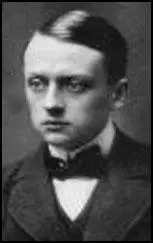Edward Knoblock

Edward Knoblauch (later changed to Knoblock), the fourth of the eleven children of Charles Knoblauch, was born at 60 West 17th Street, New York City, on 7th April 1874. His father was a wealthy businessman and his mother was a musician and from the age of four he was given regular piano lessons.
In 1880 his mother died suddenly; his father remarried in 1885 but he too died in 1887. According to his biographer, Eric Salmon: "His stepmother took Charles Knoblauch's children to Germany, where she was able to follow a career as a professional pianist. She was kind, and even indulgent, to the children but was severe with Edward in one particular respect: his penchant for improvisation on the piano.... Little by little, Knoblock's piano-playing dwindled and diminished. He gradually forgot it and for the next two years pursued a happy enough life as a German schoolboy."
As a teenager Knoblock returned to the United States and trained as an architect. However, after a year he gave up his studies and enrolled at Harvard University. He graduated in 1896 and then moved to Paris with the ambition of becoming a playwright. The following year he decided to settle in London. He offered scripts to both Henry Irving and Herbert Beerbohm Tree, but without success. He also became friends with Bernard Shaw, who, in 1899, gave him a part in the first production of You Never Can Tell.
In 1906 Knoblock persuaded Lena Ashwell to produced his first play, The Shulamite, in New York City. It was a great success and was also performed at the Savoy Theatre in London. His most famous play, Kismet, was first performed in 1911. The following year he joined forces with Arnold Bennett to produce Milestones. During this period he was considered to be an important young playwright.
During the early states of the First World War he was recruited by Mansfield Smith-Cumming, the head of MI6. Smith-Cumming had lost his leg in a car accident. Knoblock later recalled that Smith-Cumming acquired a prosthetic limb made of wood, he used it to theatrical effect during interviews with potential agents. "He would terrify potential recruits by reaching for his sharp letter knife and raising it high in the air. He would then slam it through his trousers and into his wooden leg." According to Knoblock, if the candidate winced, Smith-Cumming told him, "well, I am afraid you won't do."
Knoblock wrote in Round the Room: An Autobiography (1939): "He (Smith-Cumming) had a passion for inventions of all sorts and being a rich man, he often bought the rights to them, such as strange telescopes, mysterious mechanism with which to signal in the dark.... rockets, bombs etc." Smith-Cumming had a particular fascination for invisible inks. He hired the services of the distinguished physicist, Thomas R. Merton, who conducted ink experiments with many different chemical solutions. These included potassium permanganate, antipyrine and sodium nitrate. Spies were also advised to make invisible ink from semen. However, this was eventually abandoned because of complaints about the smell from those receiving the letters.
In 1917 Knoblock purchased Beach House in Worthing. Over the next seven years he spent a considerable amount of money on the property. This included employing the services of Scottish architect Ormrod Maxwell Ayrton. He also purchased furniture from the Thomas Hope collection he had bought from a sale at Deepdene in Dorking, Surrey. His visitors included Arnold Bennett, J. B. Priestley and Compton Mackenzie.
After the war Knoblock divided his time between London and Hollywood, writing for the film company of Douglas Fairbanks and Mary Pickford. He adapted The Three Musketeers in 1921 and worked on the films Rosita (1923) and The Thief of Baghdad (1924). Knoblock also wrote the plays, Mumsie (1927) and Speakeasy (1929). Filmscripts included Love Comes Along (1930) and Knowing Men (1930). Knoblock also worked with J. B. Priestley on a dramatization of The Good Companions (1931).
Knoblock's biographer, Eric Salmon has pointed out: "Laurence Irving, in a memoir of his father and his grandfather - The Precarious Crust - ventures the opinion that Knoblock taught Bennett, Priestley, and others "the rudiments of play carpentry". Other collaborative adaptations of novels were Grand Hotel (1931), with Vicki Baum, Evensong (1932), with Beverley Nichols, and The Edwardians (1937), with Vita Sackville-West. Altogether, Knoblock wrote some thirty or forty plays, almost all of them performed in either London or New York (or both)... Always busy, always energetic, a conscientious mediocrity rather than a really distinguished writer, Knoblock nevertheless was always a person of determination and singleness of purpose."
Knoblock was sympathetic to the Republican Army in Spain and during the Spanish Civil War he allowed Beach House was used to house children evacuated from their homes in the Basque province of Biscay. The children were fleeing bombing and starvation after the destruction of the town of Guernica by the Luftwaffe. They were supported and cared for entirely by local volunteers. During the Second World War Beach House was used by the Air Training Corps.
Edward Knoblock was very close to his sister, Gertrude Knoblauch, who nursed him during his long-illness. He died at his sister's home, 21 Ashley Place, London, on 19th July 1945 at the age of seventy-one. He never married.
Primary Sources
(1) Edward Knoblock, Round the Room: An Autobiography (1939)
He (Smith-Cumming) had a passion for inventions of all sorts and being a rich man, he often bought the rights to them, such as strange telescopes, mysterious mechanism with which to signal in the dark.... rockets, bombs etc.... He would terrify potential recruits by reaching for his sharp letter knife and raising it high in the air. He would then slam it through his trousers and into his wooden leg.
